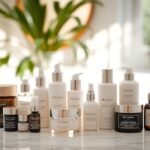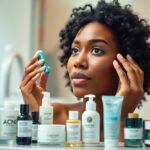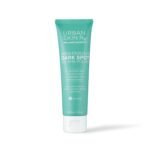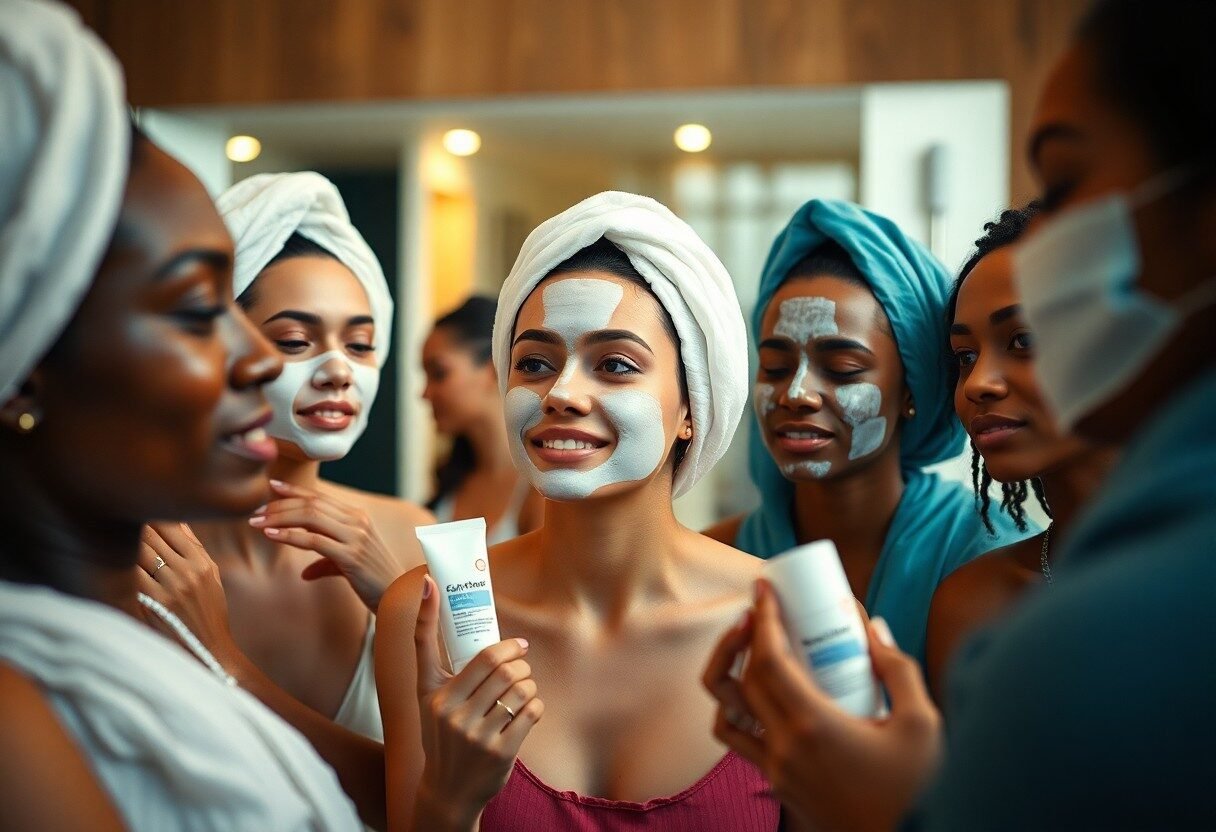
There’s a growing concern among many of us about mask-induced breakouts and irritation as we adjust to wearing masks regularly. If you’re experiencing inflamed skin, rough patches, or stubborn acne, I understand how frustrating this can be. Fortunately, by selecting the right skincare products, you can minimize these issues and restore your skin’s balance. In this post, I’ll share effective tips and product recommendations to help you combat these challenges and keep your skin looking its best, even under a mask.
Key Takeaways:
- Choose non-comedogenic skincare products to avoid clogging pores, helping prevent breakouts.
- Look for gentle, fragrance-free cleansers that can effectively remove dirt and oil without causing irritation.
- Incorporate lightweight, oil-free moisturizers to keep the skin hydrated without adding extra oil.
- Utilize salicylic acid or benzoyl peroxide spot treatments to address any emerging blemishes efficiently.
- Apply soothing ingredients like aloe vera or chamomile to calm inflammation and reduce redness.
- Exfoliate regularly but gently to remove dead skin cells and promote skin turnover.
- Give your skin time to breathe; when possible, take breaks from wearing masks to minimize irritation.
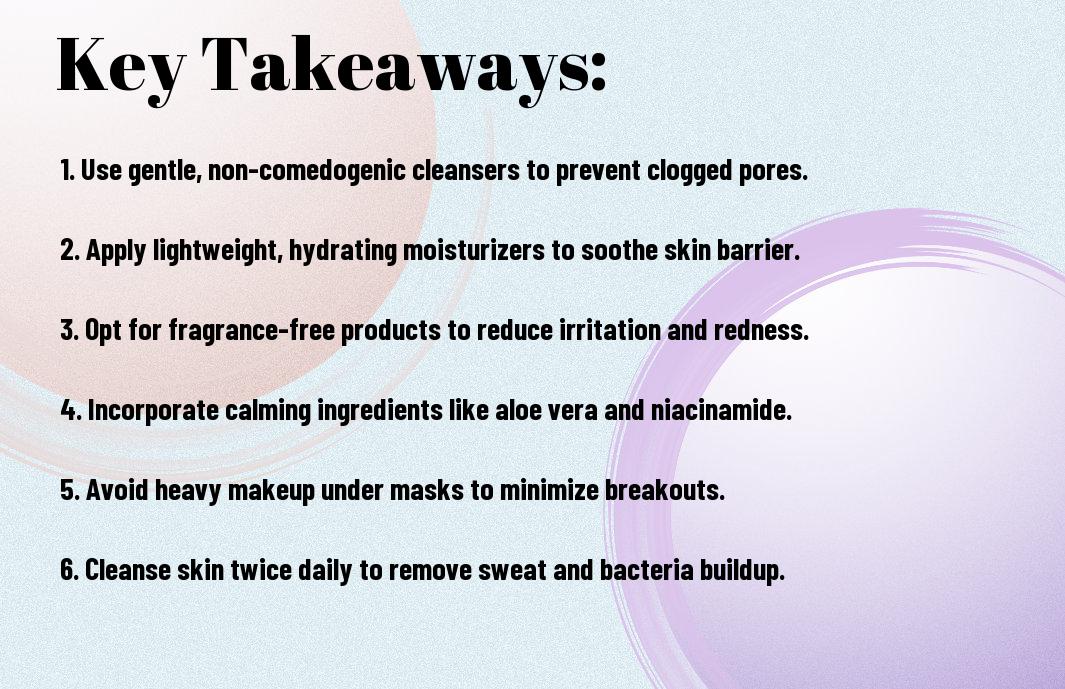
The Unseen Consequences of Wearing Masks on Skin Health
Wearing masks for extended periods can lead to several unexpected consequences for your skin health. While masks are vital for protecting ourselves and others, they create a warm, moist environment that can disrupt your skin’s natural balance. This shifts the focus from basic skincare routines to addressing more complex issues caused by prolonged wear, making it vital to understand the implications for our skin’s well-being.
The Mechanisms Behind Mask-Induced Breakouts
Mask-wearing primarily contributes to breakouts through the combination of friction, humidity, and trapped moisture. The constant contact between the mask and your skin creates an environment that promotes overactive oil production and inflammation, leading to clogged pores. Moreover, the combination of sweat and skincare products can further exacerbate the issue by trapping impurities against your skin.
Common Skin Conditions Triggered by Extended Mask Use
Extended mask use can trigger several skin conditions, including acne, contact dermatitis, and rosacea flare-ups. The already sensitive areas around the mouth and nose can become irritated due to constant friction and moisture accumulation. For those predisposed to acne, the moisture and heat create a breeding ground for bacteria, leading to breakouts along the jawline and cheeks.
As I’ve observed with many individuals, prolonged mask usage often exacerbates pre-existing conditions, especially for those with sensitive skin. Acne mechanica, a specific form of acne caused by friction from the mask, frequently makes an appearance, resulting in painful blemishes that can linger even after the mask comes off. Similarly, contact dermatitis manifests as redness, itching, or even peeling skin due to the materials in the mask or buildup of sweat and oils. Here, I find that recognizing these problems early allows for swift intervention to soothe and manage them effectively.
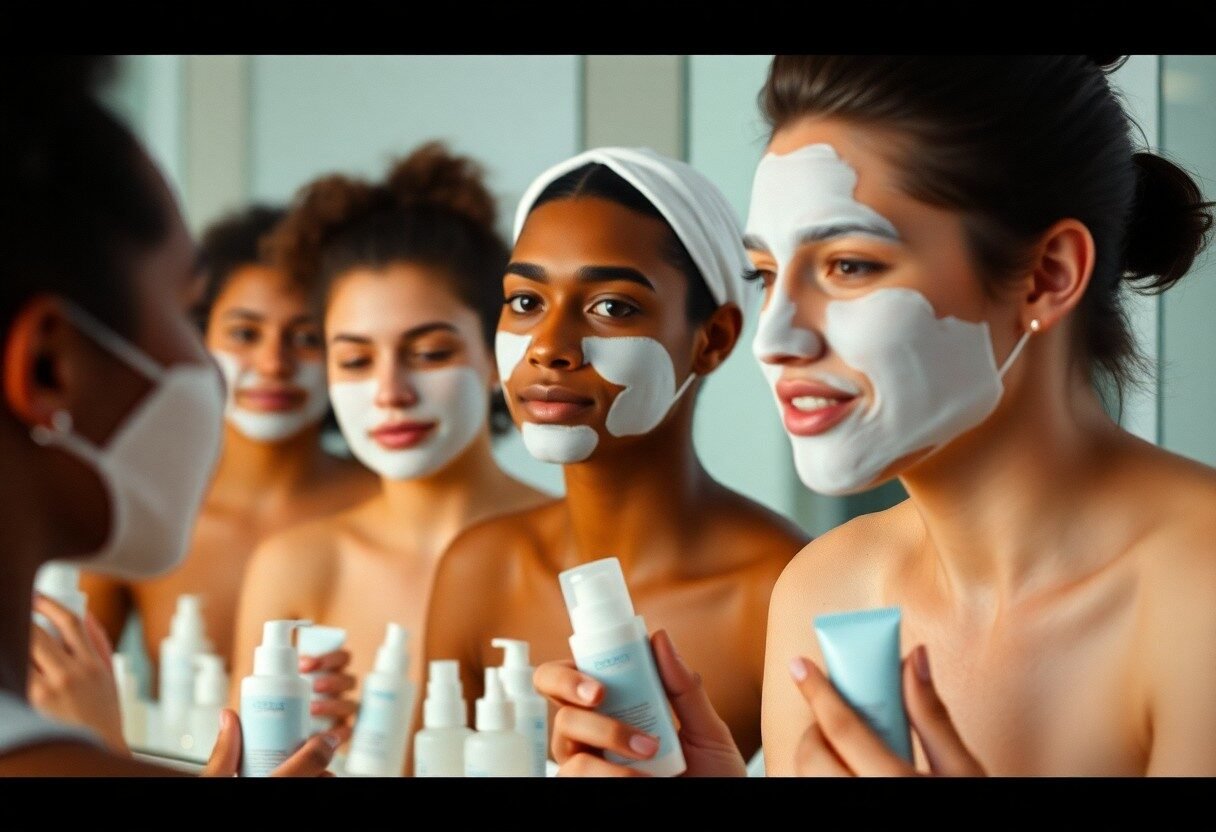
Herbal Remedies: Nature’s Solution to Skin Irritation
Turning to herbal remedies offers a gentle alternative to combat skin irritation caused by mask-wearing. Plants have been used for centuries to soothe the skin, reduce inflammation, and promote healing. Ingredients like aloe vera, chamomile, and witch hazel have proven anti-inflammatory and calming properties. By incorporating these natural solutions into your skincare regimen, you can embrace a holistic approach to relieve discomfort and reinstate your skin’s health.
Soothing Ingredients from the Earth
Nature is rich with soothing ingredients that can alleviate skin irritations. Aloe vera hydrates while reducing redness, and chamomile acts as a natural anti-inflammatory agent. Additionally, lavender not only calms the skin but also provides a relaxing aroma, enhancing your overall skincare experience. By using products infused with these herbs, you harness their healing properties to restore your skin’s balance.
How to Incorporate Herbal Products into Your Skincare Routine
Integrating herbal products into your skincare routine can be a simple yet effective way to address mask-related issues. Start by choosing a gentle cleanser containing chamomile to calm your skin without stripping its natural oils. Next, apply a soothing serum with aloe vera to further nurture and hydrate. Be sure to finish with a lightweight moisturizer that features lavender or calendula, ensuring lasting comfort and repair. Gradually, you’ll notice improved skin health and minimized irritation.
To maximize the benefits, I suggest introducing one product at a time. This allows you to monitor how your skin reacts, optimizing your routine based on its specific needs. Consider using an herbal face mist throughout the day for a refreshing boost and additional moisture. Lastly, remember to check ingredient labels; herbal formulations often deliver better results if they contain fewer synthetic additives. This mindful approach not only enhances efficacy but aligns with your commitment to nurturing your skin naturally.
The Role of Lightweight, Non-Comedogenic Formulations
Choosing lightweight and non-comedogenic formulations can be a game-changer in managing mask-induced skin issues. These specially designed products allow your skin to breathe while minimizing pores and preventing the formation of acne. Lightweight formulations often contain oil-free and water-based ingredients that hydrate without clogging your pores. This is crucial when wearing masks, as trapped moisture and oils can lead to irritation and breakouts. I personally found that switching to these formulations made a significant difference in eradicating unwanted blemishes.
Understanding Non-Comedogenic Ingredients
Non-comedogenic ingredients are specifically formulated to avoid pore-clogging, reducing the risk of breakouts. Common components include salicylic acid, which helps treat acne, and hyaluronic acid, known for its hydrating properties without excess oil. Products labeled as non-comedogenic undergo testing to ensure they won’t block pores or exacerbate skin issues. Familiarizing yourself with these ingredients can help you make informed choices when selecting skincare products that work well with your mask-wearing routine.
Recommendations for Effective Non-Comedogenic Products
When looking for effective non-comedogenic products, prioritize those that highlight lightweight moisturizers, serums, and primers as their key features. Brands like Neutrogena and Clinique offer formulations designed for acne-prone skin without heavy oils or additives. My go-to moisturizer is the Neutrogena Hydro Boost Water Gel, which hydrates effectively while keeping my pores free. Similarly, opting for a mineral-based sunscreen can protect your skin’s barrier without contributing to breakouts.
Effective non-comedogenic products often integrate additional skincare benefits, such as anti-inflammatory or soothing properties. I like formulations containing natural ingredients like green tea extract or aloe vera, which soothe the skin while fighting irritation. These elements not only boost hydration but also support your skin’s healing process, making them ideal companions for daily wear under a mask. Always check for the non-comedogenic label on the packaging, as this simple step can greatly affect the health and appearance of your skin.
Revamping Your Cleansing Routine: Essential Practices
Adjusting your cleansing routine is vital to combat the adverse effects of wearing masks. I recommend cleansing your face at least twice a day, ensuring you remove any buildup of sweat, oil, and impurities after each mask session. Double cleansing can be beneficial; start with an oil-based cleanser to dissolve makeup and grime, followed by a gentle foaming or gel cleanser to purify your skin further. This ensures you’re starting with a clean canvas every day.
Cleansing Techniques for Mask-Wearers
For those frequently wearing masks, specific cleansing techniques make a difference. Start by gently massaging your cleanser in circular motions, focusing on areas where your mask sits. This helps to dislodge dirt and prevent clogged pores. I also find that using lukewarm water is gentler on the skin compared to hot water, which can lead to increased irritation.
Tools and Products for Optimal Skin Cleansing
Utilizing the right tools and products is imperative for effectively cleansing your skin. Incorporating a soft facial brush or a konjac sponge can enhance your cleansing ability, helping to exfoliate and deeply cleanse while being gentle enough for sensitive skin. Opt for a sulfacetamide cleanser or one containing salicylic acid to combat breakouts while keeping your skin balanced. Don’t overlook the power of micellar water, especially for those quick refreshes when you can’t fully wash your face.
Facial brushes, such as the Foreo or Clarisonic, can elevate your cleansing game by providing a more thorough cleanse with their gentle bristles. If you prefer something less techy, a konjac sponge serves as a natural exfoliator that’s biodegradable and skin-friendly. Meanwhile, I prefer gel-based cleansers with ingredients like tea tree oil or witch hazel, which are fantastic for their antibacterial properties. Incorporating these specific tools and products not only helps in purging impurities but also prepares my skin for further treatments, keeping it blemish-free amidst daily mask usage.
Beyond Skincare: Lifestyle Adjustments for Healthy Skin
Your skincare routine is only part of the equation when it comes to maintaining healthy skin. Lifestyle factors also significantly impact your skin’s resilience and overall health. Small changes in your daily habits can support your skin’s natural barrier, enhance its appearance, and alleviate the aggravation brought on by mask-wearing. From dietary choices to stress management techniques, addressing these aspects can complement your skincare efforts and lead to a clearer complexion.
Diet and Hydration’s Impact on Skin Resilience
A balanced diet rich in antioxidants and omega-3 fatty acids can boost your skin’s resilience against inflammation and irritants. Incorporating foods like fruits, vegetables, nuts, and fatty fish is beneficial, while staying hydrated by drinking enough water daily helps maintain skin elasticity and prevents dryness. Aim for at least 8 glasses of water a day, and consider foods high in water content, like cucumbers and watermelon, to further support your skin’s hydration levels.
The Importance of Stress Management
Effectively managing stress is vital for your skin health, as high stress levels can trigger breakouts and exacerbate skin conditions. Adopting practices like meditation, yoga, or even simply taking daily walks can be transformative. Cortisol, the stress hormone, can increase oil production and inflammation in the skin, leading to unwanted blemishes. Incorporating stress-reduction techniques into your routine can help maintain a more balanced, clearer complexion.
High levels of stress can lead to a variety of skin issues, such as acne, eczema, and psoriasis flare-ups. Engaging in mindfulness practices, such as breathing exercises or journaling, can significantly lower stress levels. Regular physical activity not only benefits your overall health but also releases endorphins, which help improve your mood. You might be surprised at how a few minutes of deep breathing or a brisk walk around the block can not only elevate your spirits but aid your skin’s recovery processes as well.
To wrap up
From above, I hope you now feel more equipped to tackle mask-induced breakouts and irritation with the right skincare products. By understanding your skin’s specific needs and incorporating gentle, effective solutions, you can promote healing and comfort. You have the power to create a consistent routine that prioritizes both cleanliness and hydration, making a noticeable difference in how your skin responds. It’s all about finding what works best for you and adjusting as necessary to achieve healthier skin while wearing a mask.
FAQ
Q: What are mask-induced breakouts and why do they occur?
A: Mask-induced breakouts are acne or irritation that arise from wearing masks for extended periods. They occur due to a combination of factors such as friction from the mask, the trapping of moisture and heat, and the accumulation of sweat, oil, and dirt on the skin. These conditions create an ideal environment for bacteria to thrive, leading to breakouts and skin irritation.
Q: What ingredients should I look for in skincare products to combat mask-induced acne?
A: Effective ingredients to look for include salicylic acid, which helps unclog pores; benzoyl peroxide, which kills acne-causing bacteria; and niacinamide, which calms inflammation. Additionally, products containing hyaluronic acid can maintain skin hydration without adding excessive oil, making them handy for mask wearers.
Q: Can I use my regular skincare routine while wearing a mask?
A: It might be beneficial to adjust your skincare routine while wearing a mask. Consider using lighter, non-comedogenic products and avoiding heavy creams or oils that could clog pores. Keeping the routine simple with gentle cleansers and lightweight moisturizers can help maintain skin health during prolonged mask use.
Q: How can I prevent irritation from my mask on my skin?
A: To prevent irritation, choose masks made from soft, breathable materials such as cotton. Additionally, ensure that the mask fits well to avoid excessive friction. Applying a layer of a soothing serum or lightweight moisturizer before wearing the mask can create a barrier against irritation.
Q: Should I change my mask frequently to minimize skin issues?
A: Yes, changing your mask regularly is an excellent practice. A clean mask helps reduce the buildup of bacteria, oil, and sweat that can contribute to breakouts. Ideally, cotton masks should be washed after each use, while disposable masks should be discarded after one use to maintain skin hygiene.
Q: Are there specific products recommended for sensitive skin dealing with mask-related issues?
A: For sensitive skin, look for fragrance-free and hypoallergenic products. Ingredients like aloe vera, calendula, and chamomile are great for calming and soothing irritated skin. Products labeled as “non-comedogenic” are also vital to avoid exacerbating acne.
Q: How can I effectively treat existing breakouts caused by mask-wearing?
A: To treat existing breakouts, spot treatment with benzoyl peroxide or salicylic acid can be effective. Additionally, incorporating a clay mask into your routine can help absorb excess oil and draw out impurities. Consistency in following your skincare routine and avoiding touching your face will also aid in healing.
